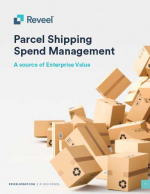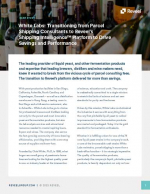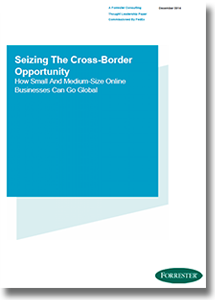Seizing The Cross-Border Opportunity
How small and medium-size online businesses can go global - a Forrester Consulting thought leadership paper commissioned by FedEx.
Through trends such as the rapid emergence of China as the global eCommerce leader and quick growth elsewhere in Asia and Latin America, online shopping has gone truly global.
The combined online retail market in countries studied by Forrester is projected to exceed $1 trillion in 2014 and nearly double within four years.
These figures don’t include various developing countries and territories currently experiencing dramatic ascendancy of their online consumer bases.
As domestic markets develop, consumers armed with various devices and payment methods have become increasingly familiar with the mechanics and benefits of shopping virtually.
In parallel, the Internet has raised awareness of new online shopping destinations. Brands and products not available in their own markets become visible, desirable, and available.What may seem like a good deal at home sometimes doesn’t look as good when compared with superior offers from abroad that may not have been accessible a few years ago.
The result is that consumers around the globe, armed with information and means, are shopping cross-border, seeking hard-to-find items and looking for deals.
Small and medium-size enterprises (SMEs) have seized upon this opportunity. For many, crossborder trade has become a highly important revenue stream too valuable to be ignored.
However, in order to succeed in the competitive online retail market, SMEs must address logistical and reputational obstacles that their larger competitors don’t face.
To understand global consumer behavior around crossborder eCommerce, as well as that of SMEs with such practices, FedEx commissioned Forrester Consulting in April 2014 to evaluate what is accelerating and slowing these buying and selling behaviors from both sides of the transaction.
Then, to further explore this topic, Forrester developed the hypothesis that SMEs face specific marketing and logistical hurdles in reaching their target customers around the globe, but they have the opportunity to tap into this sizable and lucrative market.
In conducting an in-depth survey of 9,006 global online shoppers, as well as interviews with 34 SMEs with crossborder eCommerce operations in 17 countries and territories, Forrester found that cross-border shoppers have consistent and specific needs centered on seller reputation and logistics as they purchase overseas.
Forrester also found that SMEs that sell cross-border realize they need to offer services typically associated with larger companies to overcome the concerns of international customers.
Key Findings
Forrester’s study yielded three key findings:
- Cross-border eCommerce is a major revenue opportunity for small and medium-size enterprises. Online consumers in every corner of the world are shopping cross-border for physical goods. SMEs are well positioned to win this business by highlighting their strengths and leveraging the availability of services that bridge the competitive gap with larger companies.
- SMEs must differentiate by offering unique merchandise while providing world-class service. SMEs are in a special position to provide hard-to-find products and personalized service. At the same time, they must offer great logistics and assuage concerns about reputation that their larger competitors address through scale. The good news is that there are third-party logistics providers and global/regional online marketplaces that can help SMEs with these challenges.
- Limited variability in global shopper preferences means SMEs don’t need drastically different regional eCommerce strategies. Shoppers around the world generally discover the merchants they do business with through similar methods and seek similar levels of service, negating the need for multiple overarching strategies to reach and serve them. Certain consumers, however, have somewhat varying needs based on factors such as where they live, what they are shopping for, and how much they are willing to pay. Agile SMEs can further expand their cross-border business and delight their global customers by taking advantage of these market nuances.
What’s Related




Favorites





